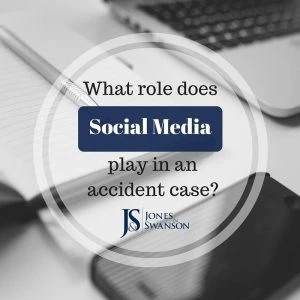
Ten years ago, social media was a faint idea for technologically savvy individuals. Over the past decade, social networking has become not only a fad, but a lifestyle. Facebook reported 1.11 billion monthly users at the end of March. On average, more than 250 million photos are uploaded every day on Facebook. Twitter reports over 200 million active users and over 400 million tweets being posted daily. In the first quarter of 2013, Instagram reached 100 million monthly active users. 100 hours of video are uploaded to YouTube every minute.
Most of our cell phones are only an arm’s length away at any given time. Within seconds we can be connected to the outside world through the web. But what many people fail to realize is that using social media oftentimes means others are connected to us as well. From your best friend to insurance companies and attorneys, social networking sites have become a source for everyone.
what Does This Mean For Personal Injury Plaintiffs?
Have you ever wondered how this could affect your personal injury claim? Many people today never give a second thought to sharing details of their personal lives with the world through various social media outlets. In many cases, when a personal injury claim is filed, insurance companies and investigators may seek to gain access to your social media accounts and could use it against you.
Everything posted to the web is considered public information and records can be traced back to authors even if a post or picture has been deleted. It is important to be careful what you post after an accident.
how Can Social Media Be Used Against You In A Lawsuit?
- Comments that seem too happy after an incident can be used by defense attorneys to show that claims for pain and suffering are false.
- Pictures, videos and even groups that you are a member of can make a judge or jury question their impression of who you are and whether or not you are truthful. For instance, the discovery of a photograph of a plaintiff riding a motorcycle after his testimony that he could no longer do so would clearly be detrimental to his case.
- Status updates are out there for everyone to see and they stay archived in your account. Something as simple as an energetic status update could be used against you by a defense attorney.
What are social media best practices?
We’ve compiled a list of do’s and don’ts when it comes to your personal injury claim and social media activity:
- Do not post about the incident
Do not post anything pertaining to the incident. Do not respond to inquiries about the accident or the treatment you’re receiving because of the accident.
- Deactivate or discontinue the use of all social media accounts
If you are serious about filing a personal injury claim, the best thing to do is deactivate your social media accounts. Make sure there is nothing posted about your accident or how you are feeling after your accident.
- Update your privacy settings
If you aren’t willing to deactivate your account, we recommend updating your privacy settings to the highest level possible. This means only those you’ve added as friends can see what you post, as opposed to the general public. Although this method isn’t foolproof, it does help keep things private from others. A tool often used for this in Facebook is the “view as” feature, which allows you to specifically outline who sees your profile and posts. Be sure to check your settings for any privacy updates that may become available over time.
- Messages
Do not send text messages, emails, or “private” social media messages regarding your accident, case, overall well-being or activities at any point. Only speak to your lawyer about the details of your treatment or status to ensure complete privacy.
- Beware of friends posting about you
It’s safer to assume that an insurance company can access your friends’ social media accounts – so information they post about you could be used against you. Others can tag you in images and posts, as well as “check you in” to locations – all of which may depict you being active. These types of things can unknowingly harm your claim. Your privacy settings can be updated to battle this issue as well, by disabling the ability for others to tag you in posts or check-ins.
searching For A Lawyer For A Personal Injury Case In Marietta?
Unfortunately, there’s no way to absolutely ensure your social media accounts not be used against you by insurance companies and opposing parties. But based on previous experience representing victims whose social media accounts have been accessed as evidence against their claims, we urge all victims to take precautions. Anything that could assist in limiting negative evidence can only benefit your chances of a successful resolution. While it is impractical to suggest your experience on Facebook should be filtered with an eye towards potential future accidents, once you have been injured it would be wise to forego discussing it on a blog or other social media outlet.
The Marietta personal injury attorneys at Jones & Swanson are experienced in representing injured clients and their families. If you or someone that you know has been injured because of another person’s negligence, contact Marietta injury lawyer Andrew W. Jones. We want to offer advice and support every step of the way to ensure that Atlanta personal injury victims receive the compensation that they deserve.
If you or a loved one have questions regarding a social media account and how it may relate to your personal injury claim, please give us a call at 770-427-5498.
Categories: Personal Injury




